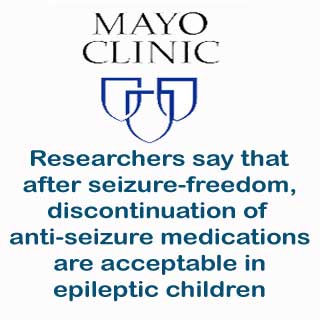
Epilepsy is a disorder where a number of seizures take place. It’s estimated that around 3 million Americans suffer from this disorder. Around 10 percent of the affected children are believed to suffer from intractable epilepsy. The condition where medications solely don’t curb seizures is called the intractable epilepsy. This has an adverse disabling effect on the patient’s quality of life.
Katherine Nickels, M.D., pediatric neurologist, Mayo Clinic, and the author of the study, says, “It is often recommended that children with epilepsy who become seizure-free on anti-seizure medications be withdrawn from the drugs to avoid side effects of long-term use. Those potential side effects include cognitive slowing, incoordination, weight change, behavioral decline, and liver damage. However, few previous studies had examined the risk of intractable epilepsy following withdrawal of anti-seizure medication, and the reported risks varied widely.”
Dr. Nickels and colleagues decided to ascertain the frequency of this disorder in children, who after their cure had discontinued taking anti-seizure medications. They studied the medical records of more than 200 epilepsy diagnosed children. Maximum of these children were found to be treated with anti-seizure medications, and also had been kept an eye on for at least five years.
Around 37 percent of these children are said to have been cured from seizures and asked to discontinue their medications. A follow-up of at least eight years revealed that around 36 percent of these children experienced one seizure on an average.
Dr. Nickels says that the chance of developing intractable epilepsy after the discontinuation of the medication was on an average around 5 percent. She also says that these chances are very similar to the risk of intractable epilepsy at the time of initial epilepsy diagnosis itself.
Thus, Dr. Nickels concludes that children, who have been cured of seizures through medications, should consider discontinuing them after recovery. They are said to not be at a high risk of developing intractable epilepsy again.
Their findings were presented at the annual meeting of the American Epilepsy Society, Seattle.
